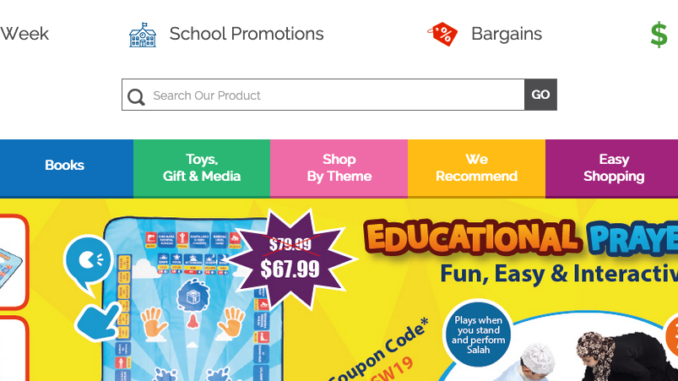
Given its endorsement of an Islamic State and its running down all kinds of fellow Muslims, why would anyone choose to publish Yahya Emerick’s “It’s All About Islam”?
I assumed that his textbooks were published overseas by some Saudi outfit. But amazingly Emerick’s traumatizing messages for children are promoted by Noor Art, an Islamic publishing house in Texas with a major focus on children.
One thing is for sure: Noor Art is not an equal opportunity publisher of all kinds of diverse Islamic voices. You won’t find them publishing thinkers like Al-Farabi, Avicenna, Nasser Hamed Abou Zaid, Mohamed Arkoun, or Mohammed Abed al-Jabri. Its selective catalogue has a clear focus on “conservative” religious texts and ideologies.
Noor Art is a business. It has evolved since its founding in 1997 by an intriguing couple: a disillusioned American Christian convert and a Palestinian immigrant. They have cornered the American market on Islamic materials for kids, and they prominently sell Emerick’s textbooks as a set.
Noor Saadah: The Convert Cofounder
The lady patron of Yahya Emerick was born Sherrie and grew up in Wisconsin. Like Emerick, she is a Midwesterner with Christian roots who became disillusioned with American society’s secularism.
Sherrie originally was an opera singer. One day she attended a Unitarian Church service in New York City and had an epiphany when she heard someone complaining that the service mentioned God too many times. If this is where Christianity was headed, Sherrie wanted something stronger.
In the late 1980s, just like Emerick, she discovered Islam, in her case from an Egyptian café owner. She, like Emerick, picked up a translation of the Quran and was hooked. In 1989, just a few months after Emerick converted, she followed, adopting the name Noor.
At age 40, she married Ammar Saadeh, a Palestinian immigrant who grew up in Kuwait. Beating the biological clock just in time, she had a son a year later – the couple’s only child.
Noor Saadeh’s Passion for Children’s Educational Material
As a new mother, Noor channeled her musical talent towards educating children. Like Emerick, she noticed a lack of quality products to entertain Muslim children and saw the importance of educating American-born kids in a way that could resonate with them. She narrated Quranic stories and made Islamic versions of popular American nursery rhymes like Yankee Doodle.
The couple created Noor Art as a company to promote these products. Their first project was the “We Are Muslims” audio series. Soon after came Razanne, a hijabi alternative to Barbie. With time, Noor Art became one of the premier sources for Muslim educational content in America.
In interviews, Noor comes across as a lovely, normal women. Her gentle voice and nice statements are appealing. She emphasizes that Noor Art products are fun and positive and sincere. So how could this lady publish Emerick’s abusive material?
I can’t say for sure. It’s possible she never really read Emerick’s textbooks. Perhaps she just loved the parallels in their personal stories and their shared commitment to producing engaging material on Islam for American-born kids. The less appealing possibility: she knows what she is doing and shares Emerick’s agenda.
Ammar Saadah: The Co-Publisher
The Razanne doll was Ammar’s idea. He clearly has an entrepreneurial bent.
After graduating from university, he and Noor moved to the Berkshires in Western Massachusetts, then to Michigan, and now reside in Richardson, Texas.
There isn’t much public information on Ammar. But while his wife as a convert might not fully grasp the ideological agenda of Yahya Emerick, Ammar can’t make that excuse. As a native Arabic speaker raised in the Middle East and of a certain age, he can’t be ignorant of the ideological bent of Emerick’s textbooks.
He may just be a businessman looking at dollars and cents. But that’s no excuse. He is making money off of hate, and our children are paying the price.
Whatever this outfit is, it’s time for capitalism to work. Noor Art shouldn’t dominate children’s publishing – and we the consumers (parents and children) deserve healthier products.
